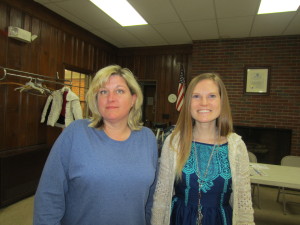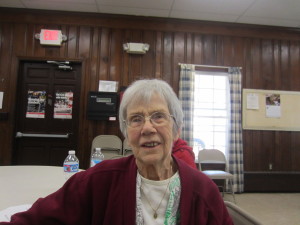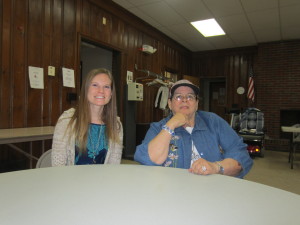Our Residents
Seniors at Forest Park Manor learn how to spot depression
The winter has a way of bringing people down, and the elderly are no exception.
Snowstorm upon snowstorm and weeks of freezing temperatures meant many seniors didn’t get outside much this winter. Many were housebound and lonely, and vulnerable to that sad feeling feeding on itself.
After hearing from many residents at Forest Park Manor about the glum season, Springfield Housing Authority Resident Services Coordinator Candra Cripps invited a social worker in to talk about the blues – what depression feels like and how to tell if friends and neighbors may be falling victim to emotional downturn.
“I hear about it often enough,” said Cripps, who works with elderly SHA residents at several developments across the city.

SHA Resident Service Coordinator Candra Cripps and Elder Clinical Coordinator Rebecca Kessler of the Center for Human Development’s Hawthorn Elder Care met with residents at Forest Park Manor to talk about depression.
“People talk about being depressed. It was a tough winter. Nobody liked it,” she said. “We want to be smart about it, to get together and learn about it, talk about it. It has to be a good thing to do this.”
Sure enough, when Elder Clinical Coordinator Rebecca Kessler of the Center for Human Development’s Hawthorn Elder Care facility began talking about possible signs of depression, the dozen SHA residents gathered began opening up about how they see mood changes among their friends and neighbors, and even at times themselves.
Kessler explained that while seniors may believe it’s normal to feel to feel down and out at times, depression is not a normal state of mind and should not be ignored.
“It’s really not normal to be depressed,” Kessler said. “Just because you’re getting older, doesn’t mean you should be depressed.”
Kessler used composite examples of people who behaved in ways that might signify depression: not caring about appearance, suddenly not wanting to socialize with friends, losing – or gaining – weight, refusing to participate in group activities, and more.
With that as a starting point, Forest Park Manor residents joined in the conversation, creating their own examples of behavior that signifies something is wrong.

Forest Park Manor resident Dorothy Tozzi said the session on depression was interesting and helpful.
Kessler noted, “It’s a good indication if you see someone who is usually all fixed up and suddenly they’re sloppy. That could be a sign that something is wrong.”
She listed the classic signs of depression:
- Prolonged sadness
- Feeling empty
- Reduced interest in activity
- Change in appetite and weight
- Sleep disturbances
- Feelings of worthlessness
- Hopelessness
- Sense of burdensomeness
- Lack of focus
- Suicidal thoughts
Kessler also differentiated among three levels of depression: Dysthymia, or mild depression, can last more than two years and is distinguished by never feeling happy, always feeling “kind of down’; minor depression can manifest itself in problems with sleeping and changes in appetite; and major depression, which interferes with life functions such as work, school, family relationships and friendships.
Retirement can trigger depression, including thoughts of worthlessness and loneliness when busy professional lives come to a sudden stop. Children growing up and leaving home can do the same thing, she noted. Any major life changes, such as moving, chronic illness or pain, and loss of independence can start the same downward spiral into depression.
There are also gender-based differences with depression: Men are more likely to be angry, irritable, suspicious and combative, while women get sad, feel worthless, frightened and avoid conflict when depressed.
Kessler noted that there is treatment for depression, both in terms of counseling and medication. And just getting back into normal life can often make people feel better. Physical exercise is also a depression buster, she said.
Some other ideas to feel better include volunteering, finding peer support, having a pet, spending time with others, talking with friends, and seeing a doctor.
Residents shared their own feelings, and agreed that the hour-long session was time well spent.
Dorthy Tozzi said she found the topic interesting and helpful.
“Just knowing that there are so many people out there with depression, and what the signs are, is a good thing,” she said.
Corinne Turcotte said she liked hearing both the signs and symptoms of depression, and what people can do to feel better.
“This was very helpful. You might think you’re not depressed, but deep down you know it happens to a lot of people.”








